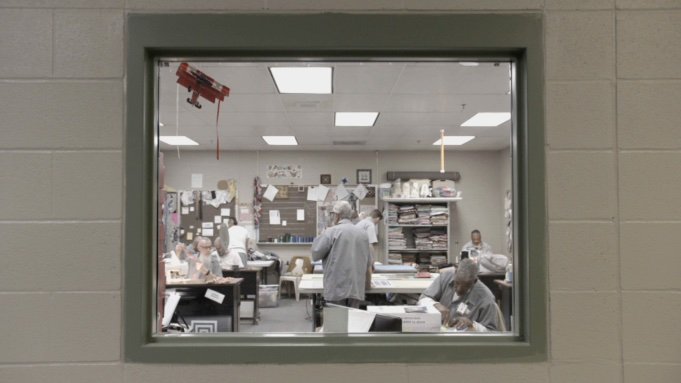Deadline
Oscar-Contending Documentary ‘The Quilters’: Behind The Walls Of A Maximum-Security Prison, Beauty And Healing Emerges
For the men of The Quilters, the Oscar-contending short documentary directed by Jenifer McShane, there is no more rewarding place to be than the sewing room. From swatches of fabric and batches of batting, they stitch together birthday quilts that bring warmth to foster children who may not have felt a lot of comfort in their lives.
“They make beautiful things,” notes McShane. “I think on a lot of levels, it’s a healing kind of activity.”
Healing, because the men of The Quilters are incarcerated in South Central Correctional Center, a Level 5 maximum-security prison in Licking, MO, south of St. Louis.
“Most of the people that’s in here messed up bad,” says Ricky in the film, a patient mentor to the quilters at their sewing stations. “They’re looking for, how would you say, a purpose.”
McShane shot a previous documentary in a prison setting, Mothers of Bedford, about incarcerated women who are mothers of school-age children. She heard about the quilters of South Central Correctional Center through her editor, Toby Shimin.
“The idea of quilters in a maximum-security prison that were male, I was just intrigued,” McShane tells Deadline. “So, I went out and just visited for a while without my camera and I was really struck… And then [the prison] provided me a surprising amount of access.”
Through the film, we get to know several of the men, including Chill, who is drawn to making quilts with butterfly motifs, because his mother loved the winged creatures.
“Every time I do butterflies, I straight think of her,” he says. Chill describes adopting a “wolf-like” persona when he’s amid the general prison population, as a survival strategy. But in the sewing room, he’s a different man. “Up here, like my emotion changed when I walked through the door.”
Chill volunteers that he’s got 14 years left to serve of a sentence for aggravated assault. But, for the most part, McShane eschews references to what has put the quilters behind bars.
“That’s not what this film is about,” she says. “There are films about why people are in prison and should they be there. And this was not about how they got there, but how they’re using their time.”
Practical questions that may arise among viewers are answered subtly in the film; for instance, who qualifies for the program (participants must maintain a spotless conduct record) and how implements necessary for sewing are accounted for (scissors and other “sharps” are noted in a log and carefully inventoried).
“Thankfully, we’ve never had any turn up missing,” one man comments.
A deep sense of camaraderie and support among the quilters emerges as the film progresses.
“This idea that there was such collaboration, concern, perfectionism, pride — I think pride is probably the overwhelming feeling that I felt,” McShane says. “A lot of these guys have never sewed before. And it was a daunting thing. And there was just this love and concern, and it was really beautiful to observe.”
The Quilters premiered at DC/DOX in June and has screened at the Hamptons International Film Festival, Santa Fe International Film Festival, Hot Springs Documentary Film Festival, and DOC NYC among others. McShane was able to show the film to the men featured in The Quilters, a screening that was supposed to take place in a visiting room but was ultimately moved to the sewing room itself.
“They’re watching themselves in that room [while] sitting in that room. It was all a little weird,” the director recalls. “And in a rookie moment, I accidentally started to go up to turn off the lights — because you always watch a movie without lights on. Well, not in a max prison. So they all rush, ‘Jen! No, no., no.’ Aside from that rookie mistake, it was probably the most moving screen I’ve ever done because they were riveted, and they loved it and understood what I was trying to do.”
At the end of the 32-minute-long film, McShane shows images of kids receiving their quilts, a full-circle moment for the incarcerated men who crafted the works of arts.
“They were sobbing… It kind of hadn’t totally hit me how hard it would hit them,” she says. “They’ve never seen that. They’ve never seen one of their quilts on the outside being used by one of these kids. So, it was very powerful for them.”
Wider distribution plans for the film are pending. McShane was able to screen The Quilters in October at the inaugural San Quentin Film Festival in California, sharing the film with an audience that included prisoners.
“I had a couple of guys kind come up in whisper tones and tell me they crochet,” says McShane, “and definitely wanted a program like this there.”
By Matthew Carey

